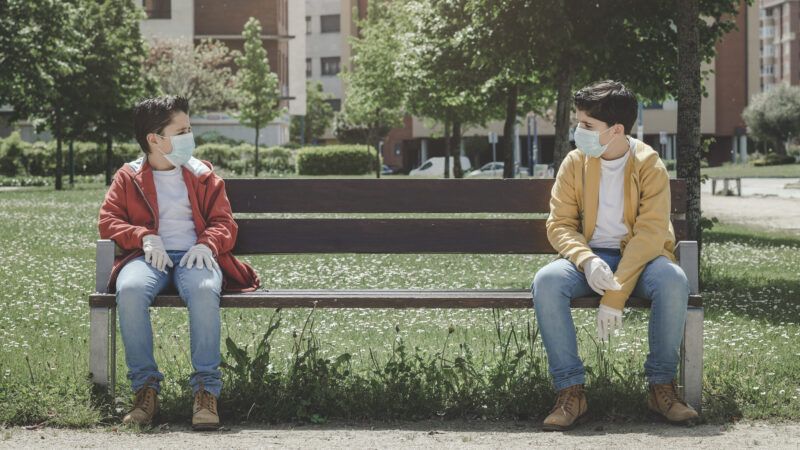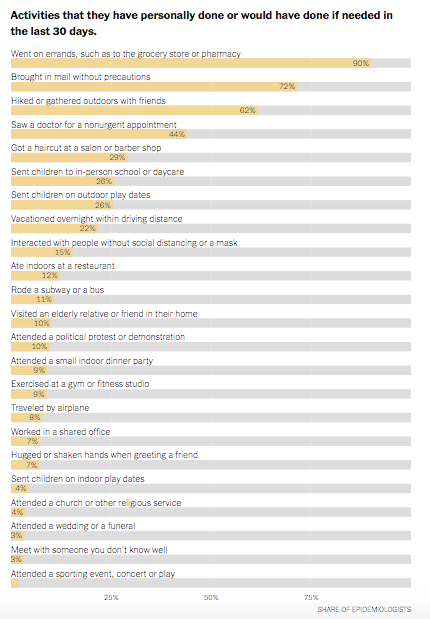Many Epidemiologists Want Social Distancing and Masks Forever—Even After the Vaccine
Everyone has a right to dissent from the epidemiologists' contentment with the way things are now.

The New York Times asked 700 epidemiologists to describe their COVID-19 habits, how their thinking has changed since the pandemic began, and when they think it will be safe for normal life to resume. Dismayingly, several answered that last question with a resounding never.
"I expect that wearing a mask will become part of my daily life, moving forward, even after a vaccine is deployed," Amy Hobbs, a research associate at the Johns Hopkins Bloomberg School of Public Health, told The Times.
Marilyn Tseng, an assistant professor at California Polytechnic State University, said life would never revert to the way it was, though the preventative measures currently practiced—masks and social distancing—will feel "normal" in time. Similarly, Vasily Vlassov, a professor at HSE University in Moscow, said life was perfectly normal now because this is the new normal.
Others disagreed. Michael Webster-Clark of the University of North Carolina at Chapel Hill said he expected "further relaxation of most precautions by mid-to-late summer 2021" following widespread availability of the vaccine. Some epidemiologists said their own risk aversion would decrease after they were vaccinated, but many said they would remain just as cautious until "80 percent or more" of the entire population had received the vaccine.

On the whole, the epidemiologists were less wary of touching surfaces than they were at the start of the pandemic, and some thought young children could go back to school. But just 26 percent said they either had or would have allowed their children to return to the classroom, or even attend an outdoor play date with friends. Only 29 percent were willing to get a haircut, even though the most infamous case involving two hairstylists who had COVID-19 resulted in not a single infection among their 139 clients. A mere 11 percent were willing to ride the subway.
Epidemiologists are free to take whatever precautions they deem necessary in their own lives, of course—as are the rest of us. But for too long, their pessimistic dictates have provided cover for politicians and government employees to make people's lives miserable. To take just the most obvious example, schools are still closed in many major cities, even as new scientific information has generally found that resuming in-person education would be perfectly fine. Teachers unions have echoed the choruses of the most alarmed public health experts, scrawling not until it's safe on their school reopening protest signs.
One of the blessings of liberty is that everybody shouldn't have to follow the same script. If a person has reasons to be extra cautious, or even just prefers the feeling of knowing that he is doing absolutely everything to reduce his own risk of catching the disease to as close to zero as possible, then he is free to live in accordance with that goal. Other people may decide their own circumstances don't require the same level of zealotry, or that their extremely low chance of having a negative health outcome justifies a greater degree of flexibility. Others may say they are fine with certain precautions—masks, avoiding large events—but need to resume small in-person social gatherings for the sake of their mental and emotional well-being. Still others may take larger risks but test themselves frequently and quarantine aggressively before traveling or visiting the elderly. The circumstances on the ground matter tremendously; a person's willingness to relax his social distancing habits should track with the rate of infection in the community, which will necessarily be different in different areas of the country.
But these choices need to devolve to individuals to the greatest extent possible, especially in the coming months, as the population becomes vaccinated and we move past the crisis point of the pandemic. The order of the day should be respecting people's preferences. If a convenience store doesn't want customers to enter unless they've been vaccinated, the store owner's wishes should be respected just as if the matter were shoelessness or shirtlessness. If a restaurant decides it really needs full capacity dining in order to stay in business, the government shouldn't deploy the police to stop them.
We all have to work it out for ourselves, and everyone who wishes to recapture the old normal is within their rights to dissent from the epidemiologists' contentment with the way things are now.


Show Comments (278)